Chapter 3 The first chapter starts from Greece and talks about Germanic
European civilization is unique because it has been the only civilization that has allowed the rest of the world to follow suit.It does this by constant conquest and settlement, strong economic power and ideology, and having things that other people aspire to.Today, scientific discoveries and technologies commonly used in all countries of the world originated from it, and science itself is one of the inventions of Europe.
At the beginning of European civilization, it consisted of three elements:
1. Ancient Greek and Roman culture.
2. Christianity—a peculiar branch of Judaism (the religion of the Jewish people).
3. The warrior culture of the Germanic barbarians who invaded the Roman Empire.
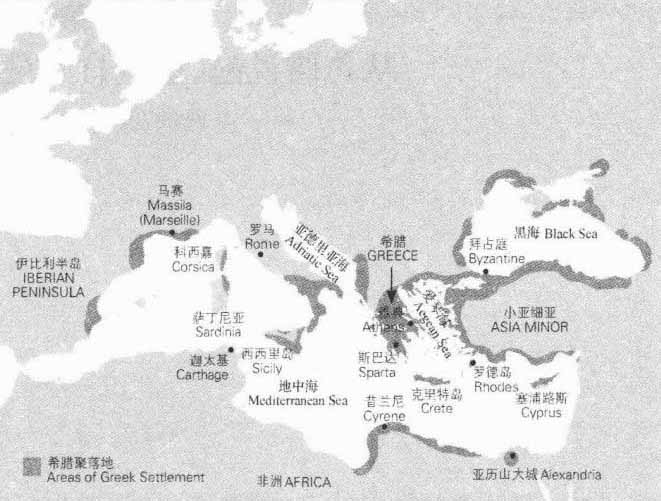
Figure 1-1 Ancient Greek cities and colonial settlements.Greek civilization flourished in the trading and agricultural settlements around the Mediterranean and Black Seas.
European civilization is a hybrid.As we continue to read, the importance of this mixed quality will slowly become apparent.
If we go to the sources of philosophy, art, literature, mathematics, science, medicine, and political thought, all of this intelligence takes us back to ancient Greece.
In the glory days of Greece, it was not a unitary country, but ruled by several small settlements, which is what we call city-states today.A city-state is a town surrounded by a circle of land, and everyone can enter the city at any time.The Greeks liked to join the city-state, as we belong to a club, based on a feeling of fellowship.The prototype of democratic politics sprouted from these small city-states, but it is not a representative democracy, and there is no need to elect members of Congress.All male citizens gather in a certain place to discuss public affairs, and laws and policies are voted on.
As the population of the city-states grew, Greece began to send people to colonize other parts of the Mediterranean.In today's Turkey, the coast of North Africa, and even as far as Spain, southern France and southern Italy, traces of Greek settlements can be found.But here in Italy, Rome was just a small village around the city of Rome today, and it was the first time to meet the Greeks and learn from them.
The Romans slowly built up a huge empire, even Greece and all the Greek colonies were within its territory.This empire is bounded by the two major rivers "Rhine" and "Danube" to the north, but sometimes beyond; to the west is the Atlantic Ocean.England was part of the Roman Empire, but Scotland and Ireland were not.The southern part of the empire reached as far as the North African desert, and the eastern border was the most difficult to determine, because there were still some empires that were hostile to it.The Roman Empire covered the entire Mediterranean; but only part of its territory belonged to what is today Europe, mostly in Turkey, the Middle East, and North Africa.
The Romans were more valiant than the Greeks.The laws they used to govern the empire were superior to those of the Greeks, and the engineering buildings that were extremely useful for fighting and governing the country were also of a higher standard than the Greeks.In other respects, however, even the Romans acknowledged the superiority of the Greeks, and willingly groveled and copied them.Rome's elite spoke Greek as well as their native Latin; they sent their sons to Athens for college, or hired Greek slaves to homeschool their children.Therefore, when we talk about the Roman Empire, we often describe it as "Greco-Roman style" because the Romans were happy to see such a development.
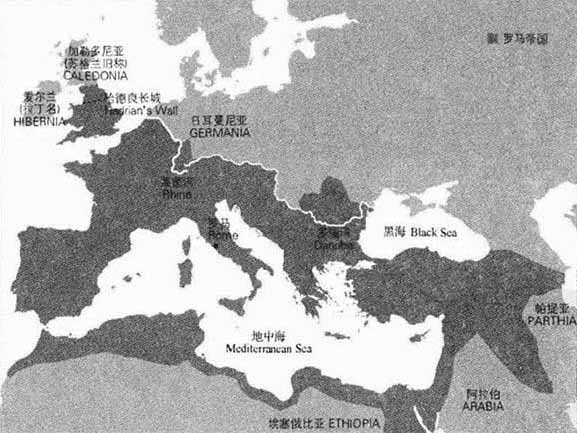
Figure 1-2 The territory of the Roman Empire in the 1st century AD
The easiest way to see how smart the Greeks were is from geometry.The geometry we learn in school is inherited from the Greeks.Many people may have forgotten geometry, so let's start with the basics.
Geometry works by starting from a few basic definitions and deriving other rules from them.Its origin is "point", which the Greeks defined for "point" is: something that has a position but no magnitude.In fact, of course it also has magnitude, like the point at the bottom of this page has width (diameter), but geometry can be said to be a kind of imaginary world, a pure world.Then there's "line" which has length but no width, and then there's the definition of "straight line": the shortest line between two points.From these three definitions, you can build the definition of a circle: First, it is a line that makes a closed figure.But how would you describe "circle"?If you think about it carefully, circle is really hard to describe.Its definition is: there is a central point in this figure, and all straight lines connecting this figure from this fixed point are equidistant.
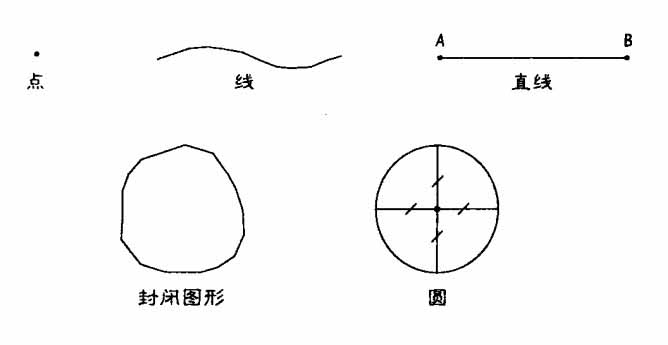 In addition to circles, you can also define parallel lines that can extend infinitely but never meet, as well as a variety of common shapes such as triangles, squares, and rectangles.These shapes are all composed of lines. In addition to their well-defined and clear characteristics, the Greeks have explored the possibility of various intersections and overlaps with each other.Everything can be proved by means of the previously established definitions.For example, as long as the properties of parallel lines are used, it can be proved that the three angles of a triangle add up to 180 degrees.
Geometry is a simple, elegant, logical system that is very pleasing and beautiful.beautiful?The Greeks did think it was beautiful.
And from the motivation of the Greeks to learn geometry, we can also get a glimpse of their minds.We do geometry in school as a problem, but the Greeks didn't think of it as a problem, nor because it had a practical use in measuring or navigating.In their eyes, geometry is a way to guide human beings to understand the nature of the universe.When we look around, we are attracted by the variety and richness of the world before us, and everything appears randomly and randomly.But the Greeks believed that all this could be explained by simple reasoning.Behind these diverse appearances, there must be a simple, regular, and logical principle behind it, such as geometry.
In addition to circles, you can also define parallel lines that can extend infinitely but never meet, as well as a variety of common shapes such as triangles, squares, and rectangles.These shapes are all composed of lines. In addition to their well-defined and clear characteristics, the Greeks have explored the possibility of various intersections and overlaps with each other.Everything can be proved by means of the previously established definitions.For example, as long as the properties of parallel lines are used, it can be proved that the three angles of a triangle add up to 180 degrees.
Geometry is a simple, elegant, logical system that is very pleasing and beautiful.beautiful?The Greeks did think it was beautiful.
And from the motivation of the Greeks to learn geometry, we can also get a glimpse of their minds.We do geometry in school as a problem, but the Greeks didn't think of it as a problem, nor because it had a practical use in measuring or navigating.In their eyes, geometry is a way to guide human beings to understand the nature of the universe.When we look around, we are attracted by the variety and richness of the world before us, and everything appears randomly and randomly.But the Greeks believed that all this could be explained by simple reasoning.Behind these diverse appearances, there must be a simple, regular, and logical principle behind it, such as geometry.
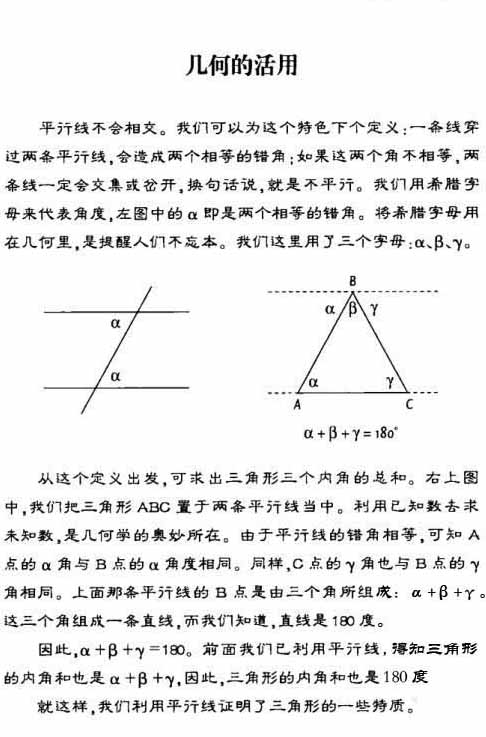 When the Greeks studied science, it was not like we first had a hypothesis and then verified it with experiments. They believed that as long as you start thinking and deliberating hard, you can get the correct answer.Therefore, they make bold guesses based on inspiration.
A Greek philosopher believed that all matter is made of water, showing how hungry they were for "simple answers."Another Greek philosopher said that all matter is composed of four things: earth, fire, water, and air.Yet another philosopher said that everything is actually made of a tiny substance he called an atom—and that was a jackpot.His inspired guess made us in the 20th century go back to study it.
Science as we know it today began four hundred years ago with the Scientific Revolution of the 17th century, two thousand years after ancient Greece.Modern science began by overturning the central teachings of Greek science, which was still dominant and authoritative at the time, but it was able to overthrow Greek science by following this Greek inspiration: answers should be simple, logical, and mathematically expressible.
Newton and Einstein, two great scientists of the 17th and 20th centuries, said in unison that only the answers are simple enough to be nearly right.Both masters of science were able to come up with solutions in mathematical formulas, using equations to describe the composition of matter and the movement of matter.
In fact, the inspiration of the Greeks was often wrong, sometimes wildly wrong.The basic intuition of the Greeks that the answer should be simple, logical, and expressible mathematically could also be wrong.But it turned out that the greatest achievements of European civilization should still be attributed to the Greeks.
Why are the Greeks so smart?I don't think we can explain why.It stands to reason that historians should be able to clear up their doubts, but when they encounter such "big questions"—for example, why these small city-states can cultivate such logical, agile, and focused minds, they can't ask. provide a strong explanation.All historians, like everyone else, can only wonder.
Let's talk about another miracle.We are about to come to the second element of the European mixture—Christianity.The Jews have always believed that there is only one true God in the universe. This is an extremely unusual view. The Greeks and Romans believed in multiple gods, which is relatively common.The Jews also have a more unusual belief that they are God's chosen people, so the only true God will take special care of them.Therefore, the Jews must obey God's law in return. The cornerstone of this set of laws is the "Ten Commandments", which were given to them by Moses when he led them out of slavery in Egypt.Until recent years, the "Ten Commandments" have always been the core of Western morality, and Christians are familiar with it, and they can know what the content is just by saying the first few commandments.You could say that someone will always keep the eighth commandment, but sometimes break the seventh.The following is the content of the "Ten Commandments", based on the records in Chapter 20 of the "Bible Exodus".
God commanded all this, saying, "I am the LORD your God, who brought you out of the land of Egypt from the land of slavery.
"You shall have no other gods before me.
"You shall not make for yourself an image, nor shall you make any image like anything that is in the heavens, or that is in the earth, or that is under the earth, or in the water.
"You shall not take the name of the LORD your God in vain; for the LORD will not let anyone who takes his name in vain go unpunished.
"Remember the Sabbath day and keep it holy. Six days labor and do all your work, for in six days the LORD made the heaven and the earth and the sea and everything in them, and rested on the seventh day; therefore the LORD has blessed the Sabbath day and made it a holy day.
"Honor your father and your mother, so that you may live long in the land the LORD your God is giving you.
"Thou shalt not kill.
"You shall not commit adultery.
"Thou shalt not steal.
"You shall not bear false witness against anyone.
"Do not covet your neighbor's house, nor his wife, his servants, his oxen, his donkeys, or everything else that belongs to him."
The Ten Commandments are only the beginning of this code of ethics.The laws of the Jews are extremely complicated and detailed. In addition to general substantive laws, such as crime, property, inheritance, and marriage, they also cover food, cleanliness, how to manage housework, and how to offer sacrifices to God in churches.
Although the Jews believed they were God's chosen people, they had no room to dream.They were often humiliated, occupied and exiled by foreigners; however, they never doubted the existence of God or his love for them.When suffering came, they concluded that they had disobeyed God's rules and that they had offended God.Therefore, in the religion of the Jewish people, as in Christianity, morality and religion are inseparable, but this is not necessarily the case in other religions.
The gods of the Romans and Greeks were often immoral, promiscuous, scheming, and everything else.In Roman religion, gods may also punish humans, but usually not because of any immoral deeds you have done.Maybe it's just that you haven't worshiped him well enough or not enough.
Jesus, the father of Christianity, was a Jew, and all his disciples were also Jews.At the time of Jesus' ministry, the Jewish people once again lost their national sovereignty; Palestine was a remote province of the Roman Empire.
Some of Jesus' disciples had high hopes for him, hoping that he would lead an uprising against Rome.His enemies had designed him to deceive him into speaking with treasonous intent.Should we pay taxes to Rome, they ask?Jesus replied, show me a coin - what is the pattern on it?The other party replied that it was a portrait of Caesar.Jesus said, "Render to Caesar what is Caesar's, and what is God's to God."
Jesus was acquainted with the laws and teachings of the Jews, from which he derived his own teachings.Part of his teachings are summaries of the very best of the law.One of them is: You shall love the LORD your God with all your heart, with all your soul, and with all your mind, and you shall love your neighbor as yourself.
We don't know if Jesus said you can forget all the details and just remember the essentials, or if he said details like cleansing, sacrifices, etc. are also important, we don't know now.Scholars still debate how much of Jesus' instruction was within Judaism or how much it crossed the line.One thing is clear, though: he's taking old moral lessons that are already so strict that you might think they're just a dream come true.Just look at his "Sermon on the Mount," the fifth chapter of Matthew:
In this preaching, Jesus transformed the moral teachings of the Jews into universal love.
There were many preachers and prophets, Jesus was just one.The Jewish leaders were suspicious of these preachers, and it was these Jewish leaders who collaborated with the Romans and put Jesus to death.But unlike other spiritual teachers, Jesus rose from the dead—at least his followers believe so.
Many churchgoers today may think of Jesus as nothing more than a spiritual teacher, a prophet, or a virtuous man, but he was more than that.Followers of Jesus believed that he was the Son of God, and that his crucifixion was an earth-shattering event.That stands for saving humanity from destruction - a consequence of humanity's original sin.Because they brought evil into this world, God sacrificed His own Son.As long as you believe in Jesus, you can be saved. After death, not only will you not be thrown into hell and suffer the fire, but you will also be able to ascend to heaven and be with God forever.
Is such a teaching valid only for the Jews, or is it shared by all human beings?After Jesus died, his followers were divided on the issue.Traditionalists argue that you can only become a Christian if you become a Jew and follow all the strict rules of the Old Testament for Jews, including circumcision, a painful procedure for grown men .If this faction had won in the past, today's Christianity is likely to be just a small offshoot of the Jewish faith, or it has even been wiped out, and it is bound to be insignificant if not extinct.
In the end, it was the other side that won.It's a whole new religion, they say.You don't have to become a Jew first, all laws can be left behind, Christ has freed us from them; His teaching of love is above all laws.This is the view of Paul, a great missionary in the early Christian church. Some people even respect Paul as the originator of Christianity, because when Jesus died, this belief was just a Jewish family affair.Jesus was a Jew, and so were his disciples, and some wanted it to remain that way, and since Paul made it clear that it was a religion for all, Christianity has since become a world religion—at least for the first time. Such a possibility.Over the next three hundred years, it was widely disseminated and blossomed in every corner of the Roman Empire.
The third group of people in this hybrid was the Germanic barbarians who invaded the Roman Empire.Originally living on the northern border, they invaded after 400 AD, and by 476 AD they had destroyed the Western Roman Empire.The mixture of European civilization took its rough shape in places like France, Spain and Italy.
These barbarians were brutal and uneducated, leaving no written records, and we know very little about their deeds before they invaded the empire.
Their accounts are best described by the first-century Roman historian Tacitus, but this may not be first-hand either.According to his description, the leaders of these barbarians lived and fought with the warriors, and they lived for the war:
Many noble children, if their birthplace has been in peace for a long time, will deliberately provoke other tribes that are at war.These barbarians have no appetite for peace, and it is easier to gain fame in times of crisis. What's more, the only way to support the army of soldiers under their flag is to rely on violence and war.Warriors always reach out to the leader for something: give me your horse, or the bloody spear that represents victory.As for eating, no matter whether the food is rich or ordinary, it is treated as a reward.Since you are so generous, you have to rely on war and plunder to afford it.
You will find it harder to persuade a German to plow his field and wait patiently for the annual harvest than to persuade him to challenge an enemy and win a wounded reward.He believes that it is spineless and wait-and-see to get something that can be obtained by bloodshed.
When the Greeks studied science, it was not like we first had a hypothesis and then verified it with experiments. They believed that as long as you start thinking and deliberating hard, you can get the correct answer.Therefore, they make bold guesses based on inspiration.
A Greek philosopher believed that all matter is made of water, showing how hungry they were for "simple answers."Another Greek philosopher said that all matter is composed of four things: earth, fire, water, and air.Yet another philosopher said that everything is actually made of a tiny substance he called an atom—and that was a jackpot.His inspired guess made us in the 20th century go back to study it.
Science as we know it today began four hundred years ago with the Scientific Revolution of the 17th century, two thousand years after ancient Greece.Modern science began by overturning the central teachings of Greek science, which was still dominant and authoritative at the time, but it was able to overthrow Greek science by following this Greek inspiration: answers should be simple, logical, and mathematically expressible.
Newton and Einstein, two great scientists of the 17th and 20th centuries, said in unison that only the answers are simple enough to be nearly right.Both masters of science were able to come up with solutions in mathematical formulas, using equations to describe the composition of matter and the movement of matter.
In fact, the inspiration of the Greeks was often wrong, sometimes wildly wrong.The basic intuition of the Greeks that the answer should be simple, logical, and expressible mathematically could also be wrong.But it turned out that the greatest achievements of European civilization should still be attributed to the Greeks.
Why are the Greeks so smart?I don't think we can explain why.It stands to reason that historians should be able to clear up their doubts, but when they encounter such "big questions"—for example, why these small city-states can cultivate such logical, agile, and focused minds, they can't ask. provide a strong explanation.All historians, like everyone else, can only wonder.
Let's talk about another miracle.We are about to come to the second element of the European mixture—Christianity.The Jews have always believed that there is only one true God in the universe. This is an extremely unusual view. The Greeks and Romans believed in multiple gods, which is relatively common.The Jews also have a more unusual belief that they are God's chosen people, so the only true God will take special care of them.Therefore, the Jews must obey God's law in return. The cornerstone of this set of laws is the "Ten Commandments", which were given to them by Moses when he led them out of slavery in Egypt.Until recent years, the "Ten Commandments" have always been the core of Western morality, and Christians are familiar with it, and they can know what the content is just by saying the first few commandments.You could say that someone will always keep the eighth commandment, but sometimes break the seventh.The following is the content of the "Ten Commandments", based on the records in Chapter 20 of the "Bible Exodus".
God commanded all this, saying, "I am the LORD your God, who brought you out of the land of Egypt from the land of slavery.
"You shall have no other gods before me.
"You shall not make for yourself an image, nor shall you make any image like anything that is in the heavens, or that is in the earth, or that is under the earth, or in the water.
"You shall not take the name of the LORD your God in vain; for the LORD will not let anyone who takes his name in vain go unpunished.
"Remember the Sabbath day and keep it holy. Six days labor and do all your work, for in six days the LORD made the heaven and the earth and the sea and everything in them, and rested on the seventh day; therefore the LORD has blessed the Sabbath day and made it a holy day.
"Honor your father and your mother, so that you may live long in the land the LORD your God is giving you.
"Thou shalt not kill.
"You shall not commit adultery.
"Thou shalt not steal.
"You shall not bear false witness against anyone.
"Do not covet your neighbor's house, nor his wife, his servants, his oxen, his donkeys, or everything else that belongs to him."
The Ten Commandments are only the beginning of this code of ethics.The laws of the Jews are extremely complicated and detailed. In addition to general substantive laws, such as crime, property, inheritance, and marriage, they also cover food, cleanliness, how to manage housework, and how to offer sacrifices to God in churches.
Although the Jews believed they were God's chosen people, they had no room to dream.They were often humiliated, occupied and exiled by foreigners; however, they never doubted the existence of God or his love for them.When suffering came, they concluded that they had disobeyed God's rules and that they had offended God.Therefore, in the religion of the Jewish people, as in Christianity, morality and religion are inseparable, but this is not necessarily the case in other religions.
The gods of the Romans and Greeks were often immoral, promiscuous, scheming, and everything else.In Roman religion, gods may also punish humans, but usually not because of any immoral deeds you have done.Maybe it's just that you haven't worshiped him well enough or not enough.
Jesus, the father of Christianity, was a Jew, and all his disciples were also Jews.At the time of Jesus' ministry, the Jewish people once again lost their national sovereignty; Palestine was a remote province of the Roman Empire.
Some of Jesus' disciples had high hopes for him, hoping that he would lead an uprising against Rome.His enemies had designed him to deceive him into speaking with treasonous intent.Should we pay taxes to Rome, they ask?Jesus replied, show me a coin - what is the pattern on it?The other party replied that it was a portrait of Caesar.Jesus said, "Render to Caesar what is Caesar's, and what is God's to God."
Jesus was acquainted with the laws and teachings of the Jews, from which he derived his own teachings.Part of his teachings are summaries of the very best of the law.One of them is: You shall love the LORD your God with all your heart, with all your soul, and with all your mind, and you shall love your neighbor as yourself.
We don't know if Jesus said you can forget all the details and just remember the essentials, or if he said details like cleansing, sacrifices, etc. are also important, we don't know now.Scholars still debate how much of Jesus' instruction was within Judaism or how much it crossed the line.One thing is clear, though: he's taking old moral lessons that are already so strict that you might think they're just a dream come true.Just look at his "Sermon on the Mount," the fifth chapter of Matthew:
In this preaching, Jesus transformed the moral teachings of the Jews into universal love.
There were many preachers and prophets, Jesus was just one.The Jewish leaders were suspicious of these preachers, and it was these Jewish leaders who collaborated with the Romans and put Jesus to death.But unlike other spiritual teachers, Jesus rose from the dead—at least his followers believe so.
Many churchgoers today may think of Jesus as nothing more than a spiritual teacher, a prophet, or a virtuous man, but he was more than that.Followers of Jesus believed that he was the Son of God, and that his crucifixion was an earth-shattering event.That stands for saving humanity from destruction - a consequence of humanity's original sin.Because they brought evil into this world, God sacrificed His own Son.As long as you believe in Jesus, you can be saved. After death, not only will you not be thrown into hell and suffer the fire, but you will also be able to ascend to heaven and be with God forever.
Is such a teaching valid only for the Jews, or is it shared by all human beings?After Jesus died, his followers were divided on the issue.Traditionalists argue that you can only become a Christian if you become a Jew and follow all the strict rules of the Old Testament for Jews, including circumcision, a painful procedure for grown men .If this faction had won in the past, today's Christianity is likely to be just a small offshoot of the Jewish faith, or it has even been wiped out, and it is bound to be insignificant if not extinct.
In the end, it was the other side that won.It's a whole new religion, they say.You don't have to become a Jew first, all laws can be left behind, Christ has freed us from them; His teaching of love is above all laws.This is the view of Paul, a great missionary in the early Christian church. Some people even respect Paul as the originator of Christianity, because when Jesus died, this belief was just a Jewish family affair.Jesus was a Jew, and so were his disciples, and some wanted it to remain that way, and since Paul made it clear that it was a religion for all, Christianity has since become a world religion—at least for the first time. Such a possibility.Over the next three hundred years, it was widely disseminated and blossomed in every corner of the Roman Empire.
The third group of people in this hybrid was the Germanic barbarians who invaded the Roman Empire.Originally living on the northern border, they invaded after 400 AD, and by 476 AD they had destroyed the Western Roman Empire.The mixture of European civilization took its rough shape in places like France, Spain and Italy.
These barbarians were brutal and uneducated, leaving no written records, and we know very little about their deeds before they invaded the empire.
Their accounts are best described by the first-century Roman historian Tacitus, but this may not be first-hand either.According to his description, the leaders of these barbarians lived and fought with the warriors, and they lived for the war:
Many noble children, if their birthplace has been in peace for a long time, will deliberately provoke other tribes that are at war.These barbarians have no appetite for peace, and it is easier to gain fame in times of crisis. What's more, the only way to support the army of soldiers under their flag is to rely on violence and war.Warriors always reach out to the leader for something: give me your horse, or the bloody spear that represents victory.As for eating, no matter whether the food is rich or ordinary, it is treated as a reward.Since you are so generous, you have to rely on war and plunder to afford it.
You will find it harder to persuade a German to plow his field and wait patiently for the annual harvest than to persuade him to challenge an enemy and win a wounded reward.He believes that it is spineless and wait-and-see to get something that can be obtained by bloodshed.
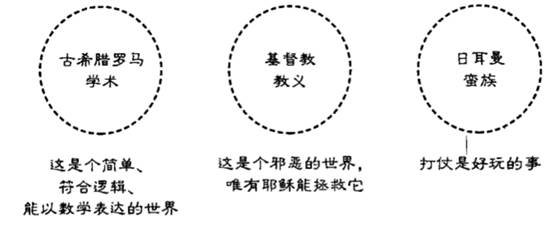 Such barbarians replaced the entire Roman Empire three hundred years later.
Now that we have examined these three constituent elements, here is a summary. (see picture above)
Greek point of view: This is a simple, logical, mathematically expressible world.Christian point of view: This is an evil world and only Jesus can save it.The point of view of the Germanic barbarians is: fighting is fun.These seemingly far-flung elements combined to create European civilization.
How do these three elements fit together?First, consider the connection between Christianity and the Greco-Roman world.Christianity was often persecuted by the Roman government.They confiscated the "Bible" books, seized church property, arrested Christians and tortured them, and executed those who refused to forsake Christ.
Romans are very accommodating.The empire they ruled was made up of many races and religions, so as long as you behave yourself, the Romans will let you go your own way.You can govern yourself, you can practice your own religion, except for one thing: you must worship the emperor, because the Romans believed that the king was no more than a god.
The amount of worship you have to do is actually trivial.For example, if there is a fire in front of a portrait or a statue of a king, you have to take a pinch of salt and sprinkle it on the fire to make the fire grow, and that is enough, similar to saluting the flag or singing the national anthem today.But the Christians would not do this, because they, like the Jews, said they could worship only one true God, and therefore refused to treat the king as a god under any circumstances.
It's just that the Jews refused to pay homage to the king, and the Romans usually let them go, because in the eyes of the Romans, the Jews were just a queer, capricious but recognizable ancient people, which occupied one side of the country and had their own temples and patron saints; Christians, by contrast, practiced a new religion, and anyone could be a Christian, and there could be Christians anywhere.The Romans believed that Christians were subversives who had to be eradicated quickly.It’s just that if the Romans had continued to persecute, this goal might have been achieved already.
However, a miracle happened.In AD 313, Emperor Constantine became a Christian, or at least publicly supported the Christian Church.He believed that the Christian gods could favor him and make his empire superior to all other empires.At that time, Christianity was still far from becoming the mainstream belief, but the ruler of the country embraced it with open arms; he used money to support the church and endorsed the bishop's right to rule.Fifty years later, another Christian monarch banned paganism and only respected Christianity as the state religion.And so, four hundred years after Jesus preached in one of the remote provinces of the Roman Empire, Christianity became the official and only religion of the empire.
Bishops and clergymen can now roam towns and villages, destroying pagan temples.This is the first connection of the three elements: the Roman Empire becomes Christian.
Such barbarians replaced the entire Roman Empire three hundred years later.
Now that we have examined these three constituent elements, here is a summary. (see picture above)
Greek point of view: This is a simple, logical, mathematically expressible world.Christian point of view: This is an evil world and only Jesus can save it.The point of view of the Germanic barbarians is: fighting is fun.These seemingly far-flung elements combined to create European civilization.
How do these three elements fit together?First, consider the connection between Christianity and the Greco-Roman world.Christianity was often persecuted by the Roman government.They confiscated the "Bible" books, seized church property, arrested Christians and tortured them, and executed those who refused to forsake Christ.
Romans are very accommodating.The empire they ruled was made up of many races and religions, so as long as you behave yourself, the Romans will let you go your own way.You can govern yourself, you can practice your own religion, except for one thing: you must worship the emperor, because the Romans believed that the king was no more than a god.
The amount of worship you have to do is actually trivial.For example, if there is a fire in front of a portrait or a statue of a king, you have to take a pinch of salt and sprinkle it on the fire to make the fire grow, and that is enough, similar to saluting the flag or singing the national anthem today.But the Christians would not do this, because they, like the Jews, said they could worship only one true God, and therefore refused to treat the king as a god under any circumstances.
It's just that the Jews refused to pay homage to the king, and the Romans usually let them go, because in the eyes of the Romans, the Jews were just a queer, capricious but recognizable ancient people, which occupied one side of the country and had their own temples and patron saints; Christians, by contrast, practiced a new religion, and anyone could be a Christian, and there could be Christians anywhere.The Romans believed that Christians were subversives who had to be eradicated quickly.It’s just that if the Romans had continued to persecute, this goal might have been achieved already.
However, a miracle happened.In AD 313, Emperor Constantine became a Christian, or at least publicly supported the Christian Church.He believed that the Christian gods could favor him and make his empire superior to all other empires.At that time, Christianity was still far from becoming the mainstream belief, but the ruler of the country embraced it with open arms; he used money to support the church and endorsed the bishop's right to rule.Fifty years later, another Christian monarch banned paganism and only respected Christianity as the state religion.And so, four hundred years after Jesus preached in one of the remote provinces of the Roman Empire, Christianity became the official and only religion of the empire.
Bishops and clergymen can now roam towns and villages, destroying pagan temples.This is the first connection of the three elements: the Roman Empire becomes Christian.
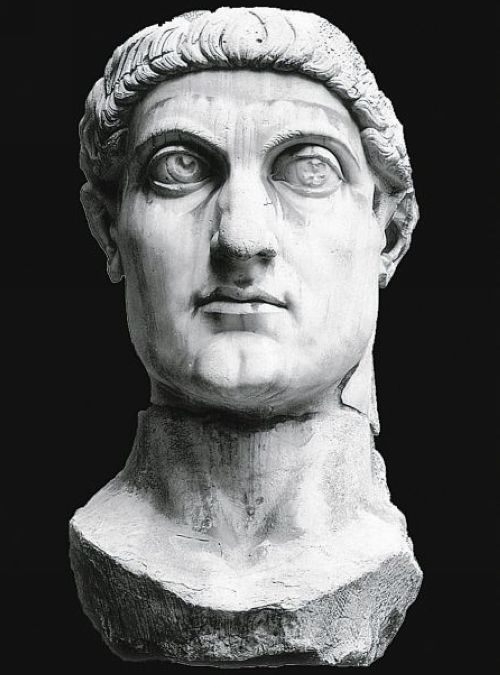
Figure 1-3 Constantine the Great (272-337), the Roman emperor who legalized Christianity in 313 AD.
The church at this time was very different from the early church.At the beginning, Christian groups met in private houses. Now, three or four hundred years later, they have a complete hierarchical organization: parish priests (priests), bishops, and archbishops. The clergy are not only full-time, but also have salaries. take.One of the bishops, that is, the bishop of Rome, even put himself on the throne of the pope and took charge of the entire church.This church has its own legal system and also has courts and prisons to enforce the laws.The church is not only in charge of academic affairs, but also other important matters, such as marriage and inheritance.The church also has its own tax system, since all people are obliged to contribute money to support it.
After the fall of the Roman Empire, the Church survived—as an independent government.The role of the pope is equal to that of the Roman emperor, governing all levels of civil and military officials under his command.The second link that made this combination was this: the Church became the Church of the Romans.
After the fall of the Roman Empire, the Church preserved Greek and Roman scholarship (as it had done before).This is a surprising development because the writers, philosophers, and scientists of ancient Greece and Rome were all pagans, not Christians.Why does the Christian church go to such trouble for these people?There is a faction in the church that says they shouldn't do this because the written accounts are false and the only truth is Jesus Christ. "What is the relationship between Athens and Jerusalem?" Tertullian (Tertullian, a famous Christian theologian) said.However, this view did not prevail in the end.
Christians did not make their own educational system, and therefore, at the beginning of the institutionalization of this belief by order of the Christian Church, they relied heavily on the assistance of high-level intellectuals familiar with the Greco-Roman tradition.These people use Greek philosophy and logic to explain and defend Christian doctrine.Christian scholars believe that the great philosophers and moralists of ancient Greece and Rome only touched part of the truth, and that Christian teachings are taken for granted as complete; however, these Greek philosophers can serve as guides to guide the public to the truth and discern the truth .Therefore, although they were pagans, the Christian church preserved their writings and made good use of them.Here is the third link: the Christian church preserved the intellectual achievements of Greece and Rome.
When the Germanic barbarians invaded the Roman Empire, they had no intention of destroying it.Their purpose is to conquer cities and lands, and they want to seize the most fertile land to settle down and enjoy the good things in life.They were willing to recognize the sovereignty of the Roman sovereign.The problem is, after 400 AD, too many barbarians came and occupied too much land, and the Roman king had no territory to rule.In fact, the reason why the Roman Empire came to an end was because there was no territory left, no territory to rule.
As for the Germanic barbarians, they found themselves not only in an unexpected, but in a difficult position, the necessity of beginning to rule the societies they occupied.They were illiterate, and amidst the chaos they had created, what remained of Roman power died at last, while commerce and all towns withered.The barbarian leaders, each armed, established themselves as kings one after another, and established small states and small countries; the kingdoms killed each other, and buildings quickly rose and collapsed.In Western Europe, the rudiments of modern states—France, Spain, and England—did not emerge until hundreds of years later.
The government in these situations is so weak that it cannot even collect taxes. (The words themselves seem to us to be contradictory: a government without taxes!) The German, who was no longer just a barbarian chieftain, was now a king who divided lands among his warriors, who Incarnate as nobles, the condition is that once the king needs troops, these nobles have to supply them, and give them as much as they want.However, gradually, these nobles began to regard these lands as their own, and began to make their own decisions about how many troops to send, whether they were good or not, and why they sent troops.
Today, leaders of all countries will parade.They walked in front of the soldiers of the three armies, as if they were inspecting the appearance of the army, and occasionally spit out a few words, which followed the custom of the early Middle Ages; those kings at that time were really inspecting the soldiers sent by the nobles, while talking to themselves : "What did they send this time?"
The king has been fighting endlessly for many years. The reason may be to fight for power, to keep the ruling power from falling into the hands of the nobles, to set his own taxes, to have an army that he can fully control, and to set up his own bureaucracy.However, because of their weak footing to begin with, some things can never intimidate anyone.Private property has become sacrosanct, and the nobles have made private property the land acquired in exchange.This was a perpetual bondage to government, so that, while the kings of Europe grew in power, they never developed into despots of the East.
The despotic tyrants of the East appropriated everything in their territory, and if they needed anything, they just confiscated someone's property or sent troops to the market to bring back a bunch of things.In contrast, European governments, although they claim to be "absolute power", have never done so. "Not everything belongs to the king" is the cornerstone of European government thinking.Starting from private property rights, the concept of human rights is derived, which is the core of Western values.The idea that the powers of governments must be limited thrives because these governments are limited from the start.
"Restricting the government" also has a decisive impact on economic development.The reason why the European economy can soar into the sky is that its growth rate is unmatched by other regions, and "businessmen are guaranteed" is the key.
Knowing the background and mentality of these warriors, we should not be surprised that they became Christians after they invaded the Roman Empire.After the collapse of the Roman Empire, the Church was the only institution that survived.When these soldiers approached the city to plunder, it was often the Christian bishop who went to deal with them. He said: "You can take the land on the other side of the river, but please leave the rest to us." He may be referring to The former Governor's Mansion in Rome said that he would visit the door in the near future to assist in governing the country. The Germanic barbarian leader took it for granted and began to regard himself as the Governor.Soon, these fighters were persuaded by the bishops-the bishop told them that as long as they accepted the Christian God, they would be more able to defeat the enemy.
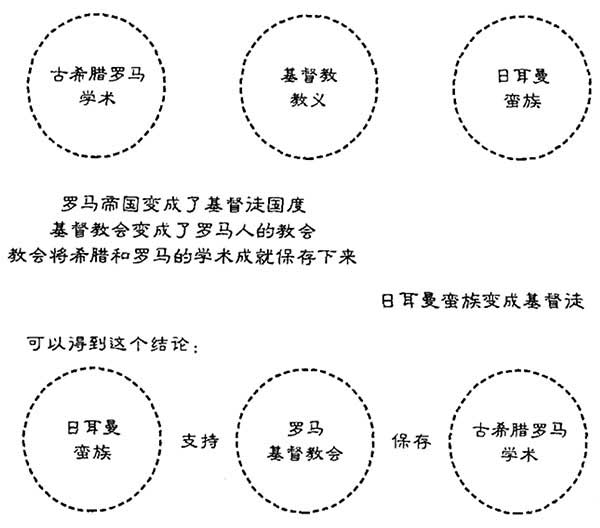
 This is a very special group of conquerors: they adopted the religion of the conquered.The church made it clear to these new rulers, kings and nobles, that one of their duties was to live the Christian faith.This is the last juncture: the Germanic barbarians supported Christianity.
If we summarize the above connection points:
It's a very weird combination, isn't it?They are not a natural alliance, it is an unstable combination.It eventually fell apart, but it held together for nearly a millennium—from the fall of the Roman Empire in AD 476 until around 1400—before falling apart.Historians call this period the Middle Ages or the Middle Ages.Some historians adopt a macro perspective and believe that 1400 AD is the starting point of modern times.From this point of view, European history can be divided into three eras: the ancient or classical period, the Middle Ages, and the modern era.
Although this weird triangle combination survived the entire Middle Ages, its elements have been changing.Take Christianity, no matter how you define it, it's not a war-prone religion.
Jesus said, "Love your enemies." This is one reason why the Romans were suspicious of the early Christians who refused to serve in the army.But the Christians and the Germanic barbarians were now in partnership.How paradoxical is this "if someone slaps you, you turn the other way" religion backed up by a group of belligerent men of steel?However, it may seem contradictory on the surface, but it is not, because since Constantine the Great converted to Christianity and made it the official state religion, the religion's ideas about violence have also begun to change.Since it is impossible for the government not to fight, if the church wants to get the support of the government, it has to nod and agree that the government can sometimes send troops to fight for the sake of fairness and justice.
However, although the church has partnered with the barbarians, it does not fully accept their values.Over the centuries, these warriors have evolved into knights.Knights love to fight and take great pride in their fighting prowess, but they fight for good reasons.The Church encouraged them to attack non-Christians—and for all the right reasons.The Church also encouraged Crusades to the holy places in the East that had fallen to Islam.If you're willing to go out and fight there, you'll get a special reward.
Knights also protect the weak, especially noble ladies of noble birth.With this new moral meaning attached to combat, a man became a knight through a ritual almost religious.He put the sword on the altar of the Christian church, and after the king wore it for him, the knight could take it outside to do good and eliminate evil.
This is a very special group of conquerors: they adopted the religion of the conquered.The church made it clear to these new rulers, kings and nobles, that one of their duties was to live the Christian faith.This is the last juncture: the Germanic barbarians supported Christianity.
If we summarize the above connection points:
It's a very weird combination, isn't it?They are not a natural alliance, it is an unstable combination.It eventually fell apart, but it held together for nearly a millennium—from the fall of the Roman Empire in AD 476 until around 1400—before falling apart.Historians call this period the Middle Ages or the Middle Ages.Some historians adopt a macro perspective and believe that 1400 AD is the starting point of modern times.From this point of view, European history can be divided into three eras: the ancient or classical period, the Middle Ages, and the modern era.
Although this weird triangle combination survived the entire Middle Ages, its elements have been changing.Take Christianity, no matter how you define it, it's not a war-prone religion.
Jesus said, "Love your enemies." This is one reason why the Romans were suspicious of the early Christians who refused to serve in the army.But the Christians and the Germanic barbarians were now in partnership.How paradoxical is this "if someone slaps you, you turn the other way" religion backed up by a group of belligerent men of steel?However, it may seem contradictory on the surface, but it is not, because since Constantine the Great converted to Christianity and made it the official state religion, the religion's ideas about violence have also begun to change.Since it is impossible for the government not to fight, if the church wants to get the support of the government, it has to nod and agree that the government can sometimes send troops to fight for the sake of fairness and justice.
However, although the church has partnered with the barbarians, it does not fully accept their values.Over the centuries, these warriors have evolved into knights.Knights love to fight and take great pride in their fighting prowess, but they fight for good reasons.The Church encouraged them to attack non-Christians—and for all the right reasons.The Church also encouraged Crusades to the holy places in the East that had fallen to Islam.If you're willing to go out and fight there, you'll get a special reward.
Knights also protect the weak, especially noble ladies of noble birth.With this new moral meaning attached to combat, a man became a knight through a ritual almost religious.He put the sword on the altar of the Christian church, and after the king wore it for him, the knight could take it outside to do good and eliminate evil.
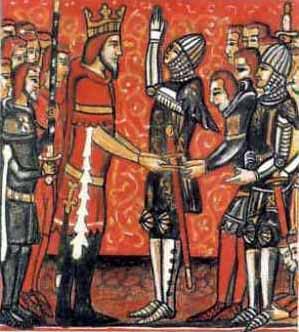
Figure 1-4 King Charles I of the Franks (Charles the Great) wears a sword for the knight Roland; according to legend, Roland was attacked and killed by Muslims (Islamists) during the expedition to Spain.
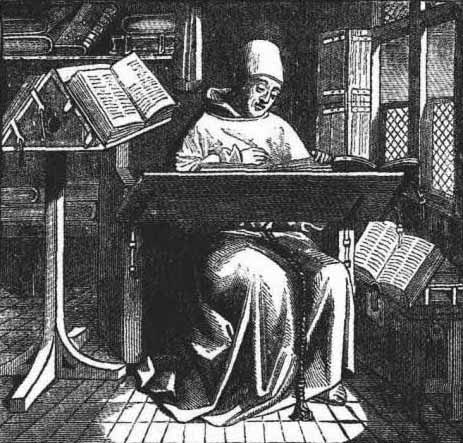
Figure 1-5 The Christian Church preserves the learning of ancient Greece and Rome in order to support its teachings.
The demeanor of protecting and respecting women has a long history in European culture.After the extinction of knights, it evolved into a "gentleman" demeanor.Gentlemen are descendants of Christian knights. When a lady enters the house, she immediately stands up to show respect;These are things I learned in school before, and it's hard to forget them after I learn them.In this respect, I find myself a medieval relic.
But modern feminists have dismissed such respect.They don't want to be exalted and respected, what they want is equality.In the movement for equal rights, they have the advantage of height - starting from a high platform is certainly better than starting from a flat ground.Since European culture inherently has this level of respect, the public accepts feminism fairly peacefully.This is very different from other cultures.
Let's move on to another tension in this combination: the Christian church was an active preserver of ancient Greek and Roman scholarship; the church didn't just keep books of wisdom in cupboards.These documents can survive, so that we have the opportunity to read today, because the entire medieval Christian church was copying, copying again and again.Back then, there was no printing, and books would rot and wither.The reason why so many precious cultural relics of Greece and Rome have survived is thanks to the monks in the monastery, although they often did not know what they were copying and were full of mistakes.
If you just read the original text, these documents represent a non-Christian pagan philosophy, values and attitudes towards life.Yet medieval Christianity's hold on intellectual life was so overwhelming that no one ever read the texts in their original form.The church's approach is to intercept the passages it wants, gather these bits and pieces out of context, and then weave them together with passages from the Bible to construct a set of Christian theology, that is, a set of God's world and an account of God's plan of redemption.In this way, Greek philosophical thinking, academic knowledge, and logical concepts were all conscripted to serve and support Christianity.If a newly discovered ancient document is unearthed, these scholars will not be disturbed, and they will compile it into the new version of theology.
Let us summarize how this combination worked in the Middle Ages.
We know that barbarians were now Christian knights, and that Greek and Roman learning was used to support Christianity.And the church, living in this weird alliance, strategized and worked hard to maintain this system.Academics are Christians, and knights are Christians. This world has become the kingdom of Christianity, and it is the world of Jesus Christ.
 After 1400 AD, this strange alliance began to break down, and what historians call "modern times" began.
After 1400 AD, this strange alliance began to break down, and what historians call "modern times" began.

Figure 1-1 Ancient Greek cities and colonial settlements.Greek civilization flourished in the trading and agricultural settlements around the Mediterranean and Black Seas.

Figure 1-2 The territory of the Roman Empire in the 1st century AD




Figure 1-3 Constantine the Great (272-337), the Roman emperor who legalized Christianity in 313 AD.



Figure 1-4 King Charles I of the Franks (Charles the Great) wears a sword for the knight Roland; according to legend, Roland was attacked and killed by Muslims (Islamists) during the expedition to Spain.

Figure 1-5 The Christian Church preserves the learning of ancient Greece and Rome in order to support its teachings.

